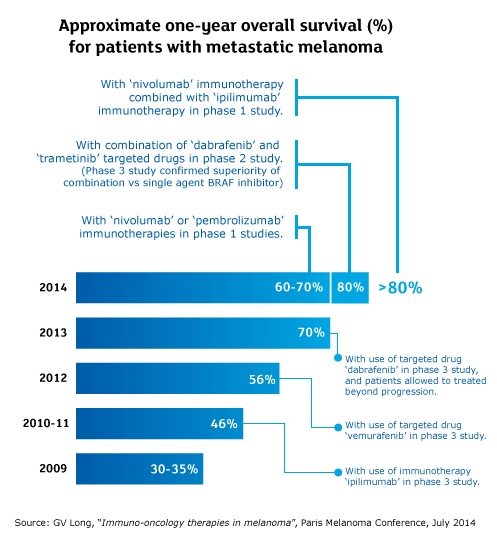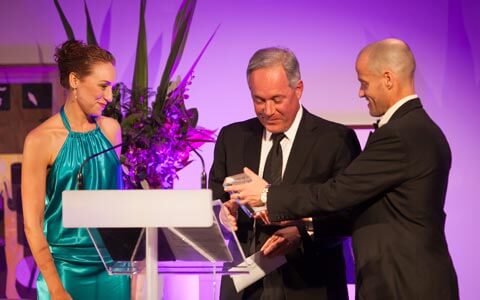NSW researcher leads world-first study into advance melanoma treatment.
Source: Cancer Institute, NSW, July 2014
Associate Professor Long, clinical researcher and medical oncologist at the Melanoma Institute and University of Sydney, presented the study to the American Society of Clinical Oncology in Chicago this June.
“To be a part of this trial that is reporting positive outcomes for patients beyond single agent targeted therapies is thrilling and important," she explains. “Until recently, every phase three trial in melanoma has been compared to chemotherapy. It was relatively easy to show a benefit with the first wave of single-agent targeted therapies against chemotherapy, but we have now shown a benefit over and above these active, single-agent targeted drugs."
The trial compares the use of two targeted drugs (dabrafenib and trametinib) to the use of one targeted drug (dabrafenib), plus a placebo. Analysis is still in the premature stages, with a large percentage of patients having only recently commenced drug treatment. However, early results show a 25 per cent reduction in the risk of progression compared with the dabrafenib plus placebo arm.
“It’s looking very good for overall survival," reports Associate Professor Long. “The median overall survival is now over two years in phase two studies of these drugs [dabrafenib and trametinib]. Before targeted therapy, it was six to nine months."
The benefit of this new therapy to people with melanoma is not just overall survival, says Associate Professor Long, but an improvement in quality of life. “Side effects are minimal and patients tolerate the treatments very well." She has had patients return to work full-time; get back on a surfboard; and, after spending weeks in a wheelchair, are now back to regular camping trips.

Lending melanoma insights to other cancers
Associate Professor Long has previously been recognised for her work in examining drivers of response and resistance to novel targeted drugs and combinations of therapies in metastatic melanoma. She was awarded Outstanding Cancer Research Fellow at the 2013 Premier’s Awards for Outstanding Cancer Research, which she says was a “great honour" and “validation that I am on the right track with my research."

For Associate Professor Long, the decoration was about raising awareness among her peers, and the public, of the work the Melanoma Institute is doing. “The Awards help build collaboration and knowledge among the scientific community and raise awareness among the public which helps philanthropy for cancer research," she says.
Melanoma has become the poster-child for the new way to treat cancer, according to Associate Professor Long, leading developments in both targeted drugs and immune therapies. “If you keep hard at it and look at what’s happening on a cellular level and what’s happening in the tumour environment, there are hooks that you can try and use to kill the cancer cells." The ‘hooks’ discovered through Associate Professor Long and her team’s research into melanoma treatment have since been rolled out to other cancers including ovarian, head and neck, lung, and renal cancers, with the potential to impact on many others.
Professor David Currow, Chief Cancer Officer and CEO of the Cancer Institute NSW, says the results coming out of Associate Professor Long’s latest trial are promising for people living with melanoma, but also for cancer research in general. “I am thrilled by the progress of Associate Professor Long’s research which has seen extraordinary advances in treatment and care for a cancer so prevalent in NSW. I am also encouraged that Associate Professor Long’s study has paved the way for new treatment options for other cancers."
The next step for Associate Professor Long is to combine targeted drugs with immune therapies to see if even better results can be achieved. She also aims to apply current research to earlier stages of melanoma to prevent people with the disease from ever becoming metastatic.
Australia is very much at the forefront of melanoma clinical trials in the world, says Associate Professor Long. “We’re very isolated and people outside Australia find that a barrier. In melanoma, however, we really force the world to stand up, pay attention and collaborate with us."
